Best Indoor Plants to Gift
Surprisingly, you can bend your green browse without stepping feet outside. Many vegetation not only flourishes indoors but can also lend to an all-natural decorative attractiveness. A little bit of greenery can create an organic and natural aesthetic, spice up your home, and add a pop of color to an otherwise neutral area.
There’s a variety of lovely houseplants that avoid requiring a lot of attention, including shrubs, succulents, cacti, climbers, creepers, and even some small trees.
Plant parenting can be so much more than a pastime. It’s an opportunity to convene with nature, even inside a cramped apartment. For those who enjoy hobbies with a little ambition built-in, houseplants offer the thrill of seeing your babies pop out new shoots and sprout new growth. Depending on which plants you choose, they’re also something green (or pink! or purple! ) and gorgeous to look at, to show off, or to act as a room’s centerpiece.
The issue is that houseplants may also die, and this happens more frequently than we’d such as to admit. That is not the plant’s fault—it’s ours. Because of this, it’s crucial in order to pick a plant that will survive plus thrive within the gentle conditions made available from your own home.
Next: Best Indoor Plants for Every Space>>
SPIDER PLANT
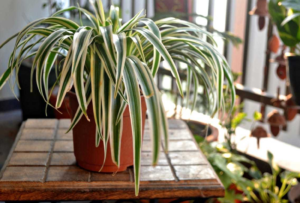
Resilient spider plants seem to thrive even when neglected. They prefer moist soil but will forgive you if you forget to water occasionally. Keep spider plants in bright to moderate light, but avoid direct sun. Fertilize spider plants twice a month during the spring and summer.
PROS: Spider plants remove benzene, carbon monoxide, formaldehyde, and xylene from the air. Spider plants are considered safe for pets.
CONS: Who knew? Spider plants are mildly hallucinogens to cats.
FICUS
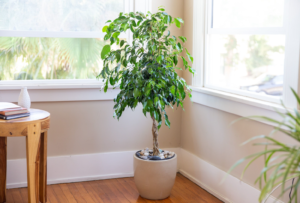
Ficus are popular houseplants and are also often named the best plants for offices. Why are the great office plants? Because they have a striking appearance and are highly effective at purifying indoor air. A ficus prefers bright, indirect light, moist soil, and occasional misting. Make sure you keep your Ficus away from drafts.
PROS: Ficus is a great plant to help you with air purity. Thanks to its decorative appeal, a ficus can serve as an attractive focal point for a room.
CONS: Ficus sap is a skin irritant to pets and people. Pets who chew on ficus leaves may vomit or experience diarrhea. Keep your Ficus in one place. It’s a finicky plant that doesn’t like to be moved.
SNAKE PLANT
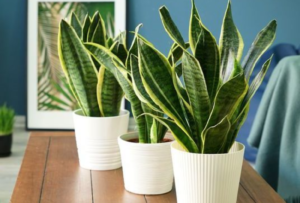
Also known as mother-in-law’s tongue and by its species name (Sansevieria trifasciata), the snake plant is hardy and adds a unique look to your decor with its upright, strap-like leaves. It can tolerate low water and light environments, though it prefers bright, indirect light.
PROS: Snake plants are on the NASA list of houseplants that clean and filter indoor air.
Caring for snake plants is relatively easy. Water them at their base. They can survive with fluorescent lighting. If they’re in a window, rotate them a quarter turn every week.
CONS: Saponins in snake plant leaves make it toxic to pets and may cause nausea and vomiting.
BAMBOO PALM
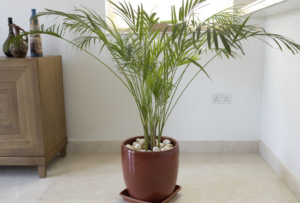
Bamboo palms are great plants if you want to add a tropical feel to your home or office. While this houseplant, also called parlor palm, prefers bright light, it can do very well in low light as long as it receives enough water. However, make sure you don’t overwater the bamboo palm. Wait until the top of the soil is dry. This plant likes high humidity, so consider placing it on a tray of pebbles with water added. As the water evaporates, add more so the pebbles are almost covered.
PROS: The Bamboo palm is excellent at reducing the airborne formaldehyde that is released by new furniture. Bamboo palm is nontoxic to pets.
CONS: Spider mites are common pests to the bamboo palm. If you see webbing in the leaves, spray Safer® Brand Insect Killing Soap on the top and bottom of the leaves.
ALOE VERA
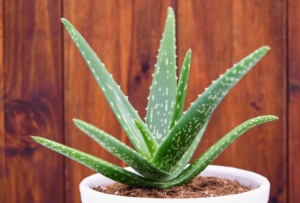
Aloe vera plants prefer bright, indirect light. While it prefers moist soil, it seems to do just fine if you forget to water it occasionally. Aloe vera is native to southern Africa but is now a common household and office plant thanks to its usefulness.
PROS: The gel-like sap from aloe vera helps heal cuts and burns. Aloe vera absorbs carbon dioxide and releases oxygen at night, making it nice to have in bedrooms. Your aloe vera plant will regularly produce plantlets. These baby plants can be removed to easily start a new plant.
CONS: If you take your aloe plant outside for the summer sun, don’t be surprised if it’s a pest magnet. The juices in this succulent are irresistible to sap-sucking insects. If that happens, douse your aloe vera plant with Safer® Brand Insect Killing Soap.